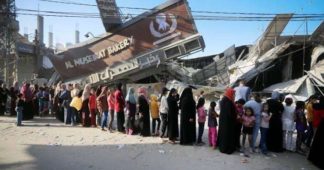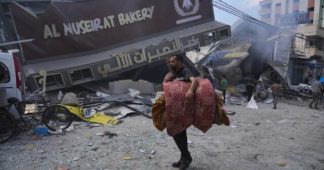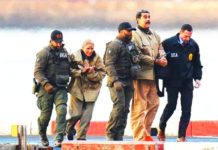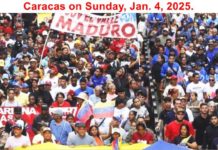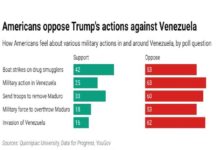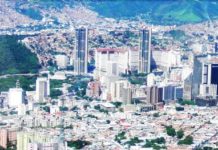By Maha Hussaini in Gaza City, occupied Palestine
Nov 19, 2025
Residents warn new UNSC plan ties Gaza’s recovery to politics and leaves urgent humanitarian needs unmet
Palestinians in the Gaza Strip have reacted with scepticism to the UN resolution authorising foreign governance and forces in the war-torn territory.
After more than two years of Israeli genocide, most of Gaza’s 2.3 million people are internally displaced and lack access to basic necessities such as food, shelter, electricity and medical services.
Many had hoped the UN would help alleviate the devastating humanitarian crisis in the enclave.
However, the passing of the US-drafted UN Security Council resolution on Monday showed that the humanitarian needs of the population are still not the top priority, said resident Abu Malek Jerjawi.
“The Security Council should have prioritised reconstruction and the urgent expansion of humanitarian relief,” Jerjawi told Middle East Eye.
“More than one million people need shelter, and even the most basic supplies are still being blocked by Israel,” he added.
Even worse, he said, the “deeply disappointing” resolution now “makes improving the humanitarian situation conditional on political requirements”.
He continued: “The Council disregarded all humanitarian needs and tied them to political considerations by linking reconstruction to disarmament. Legitimising this connection between humanitarian needs and political conditions is a disaster.”
Adopted on Monday, the UNSC 2803 resolution backs a Donald Trump-led transnational governing body of Gaza, as well as the creation of an international force to ensure the “process of demilitarising the Gaza Strip” and the “permanent decommissioning of weapons from non-state armed groups”.
‘The Council disregarded all humanitarian needs and tied them to political considerations’
– Abu Malek Jerjawi, Gaza resident
According to the resolution, it will be authorised to “use all necessary measures to carry out its mandate”.
The apparent linkage has raised concerns among some that humanitarian needs are being subordinated to political conditions, and that the recovery of more than two million civilians will depend on steps unlikely to be achievable in the short term.
Satellite analysis by the United Nations Satellite Centre (UNOSAT) shows that, as of October, roughly 81 percent of all structures in the Gaza Strip had been destroyed or damaged over more than two years of conflict.
UNOSAT recorded 123,464 destroyed buildings, 17,116 severely damaged, 33,857 moderately damaged and 23,836 possibly damaged – a total of 198,273 affected structures.
As a result, most of Gaza’s population is now living in temporary shelters, including makeshift tents, schools and badly damaged homes.
‘Our voices don’t matter’
Nermin Basel, a Gaza resident who fled during the first year of the war, said she can only trust any international plan if it guarantees that displaced Palestinians will be able to return.
“Leaving was never our choice, but staying meant certain death,” the mother of three told Middle East Eye.
“Any plan to end the war and improve the situation must ensure we can return. Otherwise, how can we trust efforts to create peace if we are not there to live in it?”
Before Israeli forces seized and closed the Gaza side of the Rafah crossing in May 2024, an estimated 100,000-115,000 Palestinians had left Gaza since the war began in October 2023.
‘The plan is not designed to bring justice or peace’
– Nermin Basel, Gaza resident
Despite the ceasefire reached on 11 October, Israeli Prime Minister Benjamin Netanyahu said the crossing would remain closed “until further notice”.
The 20-point plan, unveiled by President Trump in September 2025 alongside Netanyahu, was immediately criticised by Palestinians and rights groups for lacking consultation, overlooking Palestinian rights and risking the erosion of their claims to the land.
“The plan is not designed to bring justice or peace,” Basel said.
“It feels like an attempt to erase our struggle. Announcing a peace plan without our input suggests our voices don’t matter.
“Without ending the occupation and guaranteeing our rights, these plans become tools to weaken our identity and our claim to our land.”
Dangers of international force
While Jerjawi does not believe UN resolutions play a major role in shaping the Palestinian cause, he fears the latest one could create further tensions rather than bring stability.
He said the creation of an international force carries the potential to reignite the conflict rather than end it.
Armed Palestinian factions, including Hamas, have rejected the resolution.
Hamas said it would not disarm, arguing that “resisting occupation by all means is a legitimate right guaranteed by international laws and conventions”.
It added that the resistance’s weapons “are tied to the continuation of the occupation”, and that any discussion on disarmament should remain an internal national matter linked to a political process that ensures the end of the occupation, the establishment of a state, and the achievement of self-determination.
“My understanding of the United Nations and the Security Council has always been that their interventions aim to promote security and peace,” Jerjawi said.
“Yet the mandate granted to this force may end up reproducing the war.”
.
We remind our readers that publication of articles on our site does not mean that we agree with what is written. Our policy is to publish anything which we consider of interest, so as to assist our readers in forming their opinions. Sometimes we even publish articles with which we totally disagree, since we believe it is important for our readers to be informed on as wide a spectrum of views as possible.
